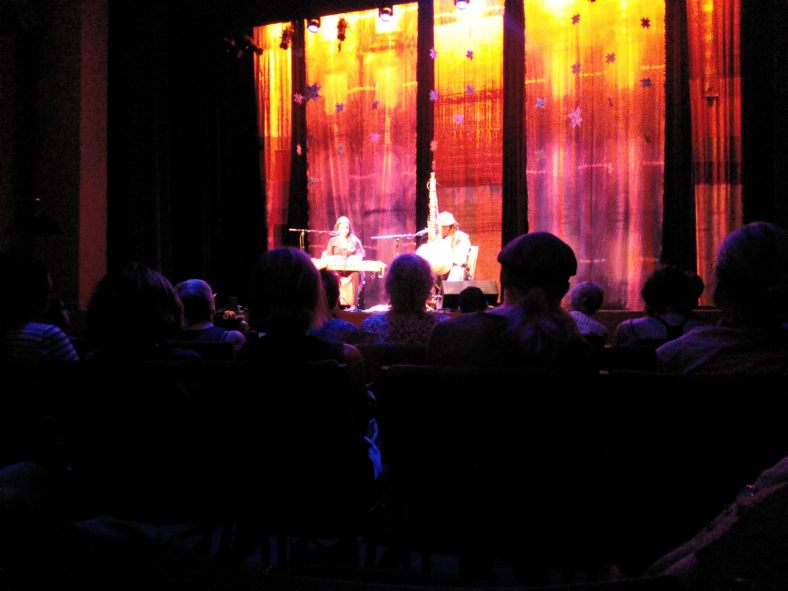What better way to start my first ever blog than share some glimpses into the world of music that everyone can relate to? Especially since I am just back from the soul stirring World Spirit Concert, which was a fitting end to the fabulous Lotus Music Festival here in Bloomington!
As I hear the lilting melodies still humming inside me, I realize what a glorious week of music I have just experienced. Monday was a welcome surprise – finding out that Ustad Amjad Ali Khan (www.sarod.com), sarod maestro from India, was performing on campus! There he was with his son Ayaan, doing a lecture-demonstration with students from Jacobs School of Music. Long long back, when I was a student in JNU, Delhi, I had been sitting up on the stage at the Siri Fort Auditorium, because it had been so packed with music lovers that they requested the students to go onstage and sit near the wings. Amjad Ali played the sarod with both his sons, Amaan and Ayaan, that time. With the passing of years, Ustadji has aged gracefully, Ayaan has matured, and I hope I still carry that same sense of wonder and appreciation of beauty around me, perhaps even more heightened with age.
While the sarod and Indian classical music has been a part of my life ever since I can remember, opera was a novel and utterly delightful experience. We watched the “Daughter of the Regiment”, which strictly speaking, is an operetta, as my German friend Sylvia (who has become a New Zealander) explained. La Fille Du Régiment was first produced by Donizetti in Paris in 1840. The fact that it continues to be performed to packed audiences is ascribed to Donizetti’s Italian style blended with French influences and the particular idiom of the opéra-comique. Listening to Soprano Kellie Motter, who played the role of Marie, was a breathtaking experience. I can only begin to imagine the talent, dedication and stamina that is needed for such a performance. The venue – Musical Arts Center at IU Bloomington – deserves a mention for its impressive looks and wonderful acoustics and is often compared to the Metropolitan Opera in New York.
Saturday found me tapping my feet on the sidewalks of downtown Bloomington, as I discovered reggae, Cuban, and Bhangra on the different streets of the city. The Bhangra music had strands of Celtic tunes woven in, and was played by The Dhol Foundation. They had the audience dancing in a frenzy, as the dhol beats merged into one large heart thumping feet pounding crowd! Feeling refreshed with a glass of Pinot Noir and exhilarated with the music, Sarah (my Kiwi friend who is originally British) and I made our way back to our apartments.
Sunday afternoon, and I am seated in Buskirk Chumley theatre – waiting for the performance to begin. The backdrop is a feast for the eyes, tie-and-dye silk drapes of gorgeous hues, which look blue and green, or pink and purple, or lovely shades of earth tones, depending on the light; with the colourfully woven stars (See ‘One Million Stars to End Violence’ Project) strung in front. The concert begins with My Larsdotter and Bubba Tomasdottir, two folk singers from Sweden and Iceland, known as My Bubba (www.ohmybubba.com). I found myself transported to a dreamworld of soft silken petals and gentle caresses as their body percussion (fascinating!) gave way to them playing the ‘old’ guitar and the ‘older’ lap harp with a quiet passion.
Few minutes into the concert I spot an empty seat closer to the stage and move there to find that I am now sitting next to Ayaan Ali Bangash! He plays the 19-stringed instrument called the sarod (of which 11 strings are not struck but they resonate with the vibrations from the plucked strings), and I was soon to learn about some more stringed instruments. Our next performers were Solo, a griot from Senegal, playing the kora which has 21 strings, and Indrė from Lithuania, playing the kanklès which has 29 strings! Indre’s fingers rippled over the strings and Solo’s kora perfectly complemented them (http://www.onerootmusic.com/artists-roster/solo-indre/). As I listened to Solo’s deep voice, I was reminded of the Bauls of Bengal, and Assam’s baritone singer Bhupen Hazarika (http://www.bhupenhazarika.com/music/index.php), particularly when Solo sang ‘Kaira’ celebrating peace.

Musicians have also been story tellers everywhere and since ancient times. We might call them a griot or a bard, a jeli or a baul, but they do not really need a language to communicate. As Ustad Amjad Ali shared with us on Monday, one does not need to ‘know’ music, but only feel it. And as I sit here steeped in rich sounds and emotions, I realize for myself that indeed, if there is one language that is common to everyone around the world, it is the language of music.








